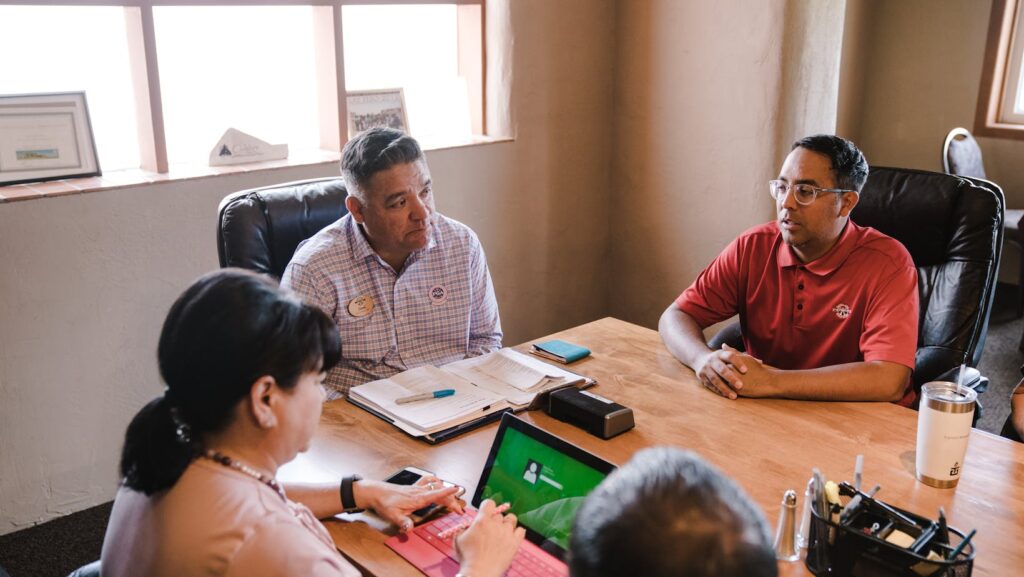Leadership is a coveted quality, often the make or break factor in business success. But how does one identify a true leader during an interview? It’s not as elusive as it seems. This article will provide insights into the art of asking the right questions to uncover leadership potential.
Interview Questions Leadership

In the quest to identify inherent leadership qualities, understanding leadership interview questions serves as a crucial component. On unveiling the rationale behind these queries, we delve further into their root objectives and their focus on key competencies.
The purpose of interview questions leadership primarily revolves around assessing the applicant’s leadership style, decision making capabilities, and team management skills. For instance, questions such as “Describe an instance where you had to lead your team during a crisis” or “How do you encourage and motivate your team members?” are avid examples of leadership probes. Each question is constructed to reveal how an individual reacts under pressure, values team input, curbs conflicts, and motivates the team to achieve common objectives. This approach aides the hiring entity to discern potential leaders, fit for their organizational ethos.
Psychology Behind leadership Interview Questions
Unveiling the Employer’s Expectations
Often times, potential employers harbor certain expectations of their prospective leaders. Leadership interview questions serve to lay bare these expectations. Each question digs into specific areas of a candidate’s experience and approach to leadership. For instance, questions probing into conflict resolution skills, offer insights into a candidate’s capability to maintain harmony and productivity within a team.
Furthermore, queries related to a candidate’s strategy in inspiring and motivating team members throw light on their ability to drive employee engagement and foster high-performing teams. Similarly, questions designed to understand how a candidate deals with failure reveal their resilience, adaptability, and capability to learn from setbacks.
How Leadership Questions Reveal Your Potential

Contrary to popular belief, interview questions leadership are not mere stumbling blocks in a candidate’s path. Rather, they’re springboards that elevate a candidate’s potential to the forefront. By crafting thoughtful, honest, and introspective responses to these questions, candidates create a portrait of their leadership style, strengths, and areas of growth.
For instance, when a candidate is asked to describe a situation where they had to make a difficult decision, the answer can exhibit the candidate’s thought process, decisiveness, ethical considerations, and the ability to make tough calls. More than that, it’s an exhibition of how they take responsibility for their decisions — a crucial trait of leadership.
Answering Like a Pro: Advanced Tips for Responding to Leadership Interview Questions
Building a Story Around Your Experiences
Crafting a narrative with personal experiences adds depth to responses and offers interviewers insight into problem-solving and decision-making competencies. Take a leadership challenge faced in a previous role, for instance. It offers an opportunity to highlight growth, learning experience, and the effective leadership action taken. Candidates, thereby, illustrate resilience, adaptability, and strategic thinking—qualities admired in leaders.
Do remember to include key details. Avoid getting bogged down with extraneous specifics that disrupt the flow of the narrative. Prioritize elements that particularly illustrate leadership capabilities like conflict resolution or team motivation, seen intricately embedded in anecdotes.
Demonstrating Emotional Intelligence in Answers

Effectively demonstrating emotional intelligence in responses often sets leaders apart. A single answer disclosing empathy, self-awareness, and effective communication skills speaks volumes about leadership acumen.
When asked about a team conflict, for example, addressing the emotional aspects involved shows empathy and understanding. Explaining how feelings were acknowledged and managed to solve the dispute exhibits emotional competency.
Strategic Interview Questions
The power of interview questions leadership lies in their ability to spotlight a candidate’s strategic thinking and problem-solving prowess. They’re a mirror that reflects leadership potential and how well someone meets the employer’s expectations for conflict resolution and team motivation. Using strategic storytelling in responses can effectively highlight skills like decision-making and resilience. Adding a dash of emotional intelligence, such as showcasing empathy in dealing with team conflicts, can set a candidate apart.



